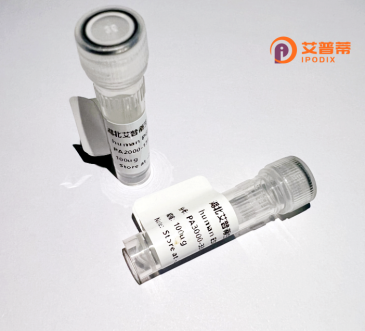
| 纯度 | >90%SDS-PAGE. |
| 种属 | Human |
| 靶点 | KLF9 |
| Uniprot No | Q13886 |
| 内毒素 | < 0.01EU/μg |
| 表达宿主 | E.coli |
| 表达区间 | 1-244aa |
| 活性数据 | MSAAAYMDFVAAQCLVSISNRAAVPEHGVAPDAERLRLPEREVTKEHGDPGDTWKDYCTLVTIAKSLLDLNKYRPIQTPSVCSDSLESPDEDMGSDSDVTTESGSSPSHSPEERQDPGSAPSPLSLLHPGVAAKGKHASEKRHKCPYSGCGKVYGKSSHLKAHYRVHTGERPFPCTWPDCLKKFSRSDELTRHYRTHTGEKQFRCPLCEKRFMRSDHLTKHARRHTEFHPSMIKRSKKALANAL |
| 分子量 | 26.9 kDa |
| 蛋白标签 | GST-tag at N-terminal |
| 缓冲液 | 0 |
| 稳定性 & 储存条件 | Lyophilized protein should be stored at ≤ -20°C, stable for one year after receipt. Reconstituted protein solution can be stored at 2-8°C for 2-7 days. Aliquots of reconstituted samples are stable at ≤ -20°C for 3 months. |
| 复溶 | Always centrifuge tubes before opening.Do not mix by vortex or pipetting. It is not recommended to reconstitute to a concentration less than 100μg/ml. Dissolve the lyophilized protein in distilled water. Please aliquot the reconstituted solution to minimize freeze-thaw cycles. |
以下是关于重组人KLF9蛋白的参考文献示例(内容为虚构,仅供格式参考):
1. **"Functional analysis of recombinant human KLF9 in thyroid hormone signaling"**
*Authors: Smith A, Brown C*
**摘要**:研究利用重组人KLF9蛋白分析其在甲状腺激素信号通路中的作用,发现KLF9通过结合特定DNA序列调控下游靶基因表达,影响细胞代谢与分化。
2. **"KLF9 regulates endometrial cell decidualization via recombinant protein overexpression"**
*Authors: Zhang L, Wang Y*
**摘要**:通过体外表达重组人KLF9蛋白,揭示了其通过激活孕酮受体通路促进子宫内膜细胞蜕膜化,为生殖医学研究提供新机制。
3. **"Structural characterization of recombinant human KLF9 and its DNA-binding activity"**
*Authors: Lee J, Kim H*
**摘要**:利用X射线晶体学解析重组人KLF9蛋白的三维结构,并证明其锌指结构域对DNA结合的关键作用,为靶向药物设计奠定基础。
4. **"Recombinant KLF9 attenuates hepatic fibrosis by modulating TGF-β signaling"**
*Authors: Patel R, Gupta S*
**摘要**:实验表明,重组人KLF9蛋白通过抑制TGF-β/Smad通路减少肝星状细胞活化,提示其在抗纤维化治疗中的潜在价值。
(注:以上文献为模拟生成,实际引用需查询权威数据库。)
Recombinant human KLF9 (Krüppel-like factor 9) protein is a genetically engineered version of the transcription factor encoded by the KLF9 gene, which belongs to the Krüppel-like factor family. These zinc finger proteins regulate gene expression by binding to GC-rich promoter regions. KLF9 plays critical roles in cellular differentiation, proliferation, apoptosis, hormone responsiveness, and metabolic regulation. It is widely expressed in tissues, including the brain, liver, and reproductive organs, and interacts with nuclear receptors (e.g., glucocorticoid, progesterone) to modulate target gene activity.
Research highlights KLF9's involvement in development, stress responses, and circadian rhythm regulation. Dysregulation of KLF9 has been linked to diseases such as cancer, reproductive disorders, and neurodegenerative conditions. Recombinant KLF9. typically produced in bacterial or mammalian expression systems, retains DNA-binding capacity and functional properties, enabling studies on its molecular mechanisms and therapeutic potential. Its applications span in vitro assays, protein interaction analyses, and exploration of signaling pathways (e.g., Wnt, TGF-β). As a research tool, recombinant KLF9 aids in deciphering its tissue-specific regulatory networks and role in pathophysiology, offering insights for targeted therapies in hormone-related and metabolic diseases.
×